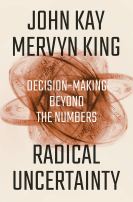From Lars Syll The rational expectations hypothesis presupposes — basically for reasons of consistency — that agents have complete knowledge of all of the relevant probability distribution functions. And when trying to incorporate learning in these models — trying to take the heat of some off the criticism launched against it up to date — it is always a very restricted kind of learning that is considered. A learning where truly unanticipated, surprising, new things never take place, but only rather mechanical updatings — increasing the precision of already existing information sets – of existing probability functions. Nothing really new happens in these ergodic models, where the statistical representation of learning and information is nothing more than a caricature of what takes place
Topics:
Lars Pålsson Syll considers the following as important: Uncategorized
This could be interesting, too:
tom writes The Ukraine war and Europe’s deepening march of folly
Stavros Mavroudeas writes CfP of Marxist Macroeconomic Modelling workgroup – 18th WAPE Forum, Istanbul August 6-8, 2025
Lars Pålsson Syll writes The pretence-of-knowledge syndrome
Dean Baker writes Crypto and Donald Trump’s strategic baseball card reserve
from Lars Syll
The rational expectations hypothesis presupposes — basically for reasons of consistency — that agents have complete knowledge of all of the relevant probability distribution functions. And when trying to incorporate learning in these models — trying to take the heat of some off the criticism launched against it up to date — it is always a very restricted kind of learning that is considered. A learning where truly unanticipated, surprising, new things never take place, but only rather mechanical updatings — increasing the precision of already existing information sets – of existing probability functions.
Nothing really new happens in these ergodic models, where the statistical representation of learning and information is nothing more than a caricature of what takes place in the real world target system. This follows from taking for granted that people’s decisions can be portrayed as based on an existing probability distribution, which by definition implies the knowledge of every possible event (otherwise it is in a strict mathematical-statistically sense not really a probability distribution) that can be thought of taking place.
But in the real world it is — as shown again and again by behavioural and experimental economics — common to mistake a conditional distribution for a probability distribution. Mistakes that are impossible to make in the kinds of economic analysis — built on the rational expectations hypothesis — that mainstream economists are such adamant propagators for. On average rational expectations agents are always correct. But truly new information will not only reduce the estimation error but actually change the entire estimation and hence possibly the decisions made. To be truly new, information has to be unexpected. If not, it would simply be inferred from the already existing information set.
In rational expectations models new information is typically presented as something only reducing the variance of the parameter estimated. But if new information means truly new information it actually could increase our uncertainty and variance (information set (A, B) => (A, B, C)).
Truly new information give birth to new probabilities, revised plans and decisions – something the rational expectations hypothesis cannot account for with its finite sampling representation of incomplete information.
In the world of rational expectations, learning is like being better and better at reciting the complete works of Shakespeare by heart — or at hitting bull’s eye when playing dart. It presupposes that we have a complete list of the possible states of the world and that by definition mistakes are non-systematic (which, strictly seen, follows from the assumption of ‘subjective’ probability distributions being equal to the ‘objective’ probability distribution). This is a rather uninteresting and trivial kind of learning. It is a closed world learning, synonymous to improving one’s adaptation to a world which is fundamentally unchanging. But in real, open world situations, learning is more often about adapting and trying to cope with genuinely new phenomena.
The rational expectations hypothesis presumes consistent behaviour, where expectations do not display any persistent errors. In the world of rational expectations we are always, on average, hitting the bull’s eye. In the more realistic, open systems view, there is always the possibility (danger) of making mistakes that may turn out to be systematic. It is because of this, presumably, that we put so much emphasis on learning in our modern knowledge societies.
So, where does all this leave us? I think John Kay and Mervyn King sum it up pretty well:

The disregard of radical uncertainty by a generation of economists condemned modern macroeconomics to near irrelevance … Keynes’ critique of ‘getting on the job’ without asking ‘whether the job is worth getting on with’ would prove to be as true of the new macroeconomic theorising as of the older econometric modeling …
Over forty years, the authors have watched the bright optimism of a new, rigorous approach to economics dissolve into the failures of prediction and analysis which were seen in the global financial crisis of 2007-08. And it is the pervasive nature of radical uncertainty which is the source of the problem.
